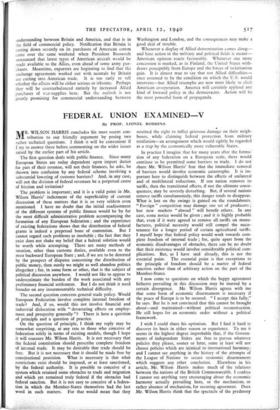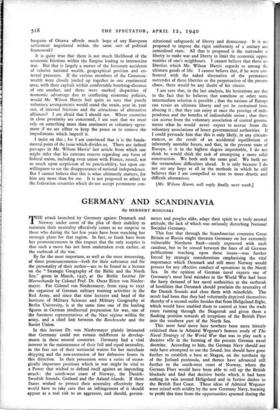FEDERAL UNION EXAMINED -V
By PROF. LIONEL ROBBINS
MR. WILSON HARRIS concludes his most recent con- tribution to our friendly argument by posing two rather technical questions. I think it will be convenient if I try to answer these before commenting on the wider issues raised by the earlier part of his article.
The first question deals with public finance. Since many European States are today dependent upon import duties for part of their revenue, will not their finances, he asks, be thrown into confusion by any federal scheme involving a substantial lowering of customs barriers? And, in any case, will not the division of federal revenues be a perpetual cause of friction and irritation?
The problem is important; and it is a valid point in Mr. Wilson Harris' indictment of the superficiality of current discussion of these matters that it is so very seldom even mentioned. I have no doubt that the initial readjustment of the different systems of public finance would be by far the most difficult administrative problem accompanying the formation of any European federation ; and the experience of existing federations shows that the distribution of federal grants is indeed a perpetual bone of contention. But I cannot regard such problems as insoluble ; the fact that they exist does not shake my belief that a federal solution would be worth while attempting. There are many methods of taxation, other than customs duties, available even to the most backward European State ; and, if we are to be deterred by the prospect of disputes concerning the distribution of public money, then surely we might as well abandon politics altogether ; for, in some form or other, that is the subject of political discussion anywhere. I would not like to appear to underestimate the burden of the work associated with any preliminary financial settlement. But I do not think it need founder on any insurmountable technical difficulty.
The second question concerns general trade policy. Would European Federation involve complete internal freedom of trade? And, if so, would this not involve financial and industrial dislocation with "devastating effects on employ- ment and prosperity generally "? There is here a question of principle and a question of practice.
On the question of principle, I think my reply may be somewhat surprising, at any rate to those who conceive of federation solely in terms of existing models, though I hope it will reassure Mr. Wilson Harris. It is not necessary that the federal constitution should prescribe complete freedom of intcrnal trade. It may be desirable that trade should be free. But it is not necessary that it should be made free by constitutional provision. What is necessary is that what restrictions exist should be imposed, or at least sanctioned, by the federal authority. It is possible to conceive of a system which retained some obstacles to trade and migration and which yet remained truly federal if the obstacles had federal sanction. But it is not easy to conceive of a federa- tion in which the Member-States themselves had the last word in such matters. For that would mean that they retained the right to inflict grievous damage on their neigh- bours, while claiming federal protection from military retaliation—an arrangement which would rightly be regarded as a trap by the economically more vulnerable States.
In practice I imagine that for many years after the forma-' tion of any federation on a European scale, there would continue to be permitted some barriers to trade. I do not share Mr. Wilson Harris' fear that the immediate removal of barriers would involve economic catastrophe. It is im- portant here to distinguish between the effects of unilateral and of multilateral reductions. If one nation removes its tariffs, then the transitional effects, if not the ultimate conse- quences, may be severely disturbing. But, if several nations remove tariffs simultaneously, this danger tends to disappear. What is lost on the swings is gained on the roundabouts. " Foreign " competition may damage one set of producers ; but new markets " abroad " will benefit others. In any case, some notice would be given ; and it is highly probable that, even if it were agreed to remove all-tariffs on manu- factures, political necessity would still compel the main- tenance for a longer period of certain agricultural tariffs. I myself hope that federal policy would work towards com- plete freedom of internal trade ; for, quite apart from the economic disadvantages of obstacles, there can be no doubt that their existence would involve considerable political com- plications. But, as I have said already, this is not the essential point. The essential point is that exceptions to the principle of freedom should be a matter of federal sanction rather than of arbitrary action on the part of the Member-States.
I now come to questions on which the happy agreement hitherto prevailing in this discussion may be marred by a certain divergence. Mr. Wilson Harris agrees with me that some form of economic disarmament is necessary if the peace of Europe is to be secured. "I accept this fully," he says. But he is not convinced that this cannot be brought about—and maintained—without political reconstruction. He still hopes for an economic order without a political framework.
I wish I could share his optimism. But I find it hard to discover its basis in either reason or experience. To me it seems in the highest degree improbable that, if the Govern- ments of independent States are free to pursue whatever policies they please, sooner or later, some at least will not choose policies which are inimical to international harmony; and I cannot see anything in the history of the attempts of the League of Nations to secure economic disarmament which suggests any other conclusion. Elsewhere in his article, Mr. Wilson Harris makes much of the relations between the nations of the British Commonwealth. I confess I cannot see anything very encouraging about the economic harmony actually prevailing here, or the mechanism, or rather absence of mechanism, for securing agreement. Does Mr. Wilson Harris think that the spectacle of the predatory bargains of Ottawa affords much hope of any European settlement negotiated within the same sort of political framework?
It is quite true that there is not much likelihood of the economic frictions within the Empire leading to internecine war. But that is largely a matter of the fortunate accidents of relative national wealth, geographical position and ex- ternal pressures. If the various members of the Common- wealth were closely jostled up together in one continental area, with their capitals within comfortable bombing-distance of one another, and there were marked disparities of economic advantage due to conflicting economic policies, would Mr. Wilson Harris feel quite so sure that purely voluntary arrangements would stand the strain, year in, year out, of internal frictions and the attractions of alternative alliances? I am afraid that I should not. Where countries in close proximity are concerned, I am sure that we must rely on something more than sentiment or voluntary agree- ment if we are either to keep the peace or to remove the impediments which imperil it.
I insist on this ; for I am convinced that it is the funda- mental point of the issue which divides us. There are indeed passages in Mr. Wilson Harris' last article from which one might infer that his extreme reserve regarding any form of federal union, including even union with France, rested, not so much upon scepticism of its practicability, but upon un- willingness to see the disappearance of national independence. But I cannot believe that this is what ultimately matters, for him any more than for me. It is not proposed to admit to the federation countries which do not accept permanent con- stitutional safeguards of liberty and democracy. It is no proposed to impose the rigid uniformity of a unitary and centralised state. All that is proposed is the surrender o: liberty to make war and liberty to limit the economic oppor- tunities of one's neighbours. I cannot believe that these are liberties which Mr. Wilson Harris regards as among the ultimate goods of life. I cannot believe that, if he were con- fronted with the naked alternative of the permanent surrender of these liberties or the perpetuation of the present chaos, there would be any doubt of his choice.
I am sure that, in the last analysis, his hesitations are due to the fact that he believes that somehow or other some intermediate solution is possible ; that the nations of Europe can retain an ultimate liberty and yet be restrained from abusing it ; that they can enjoy at once the prestige of inde- pendence and the benefits of indissoluble union ; that there can accrue from the voluntary association of central govern- ments what he would never expect to accrue from the voluntary associations of lesser governmental authorities. If I could persuade him that this is only likely, in any circum- stances, as the result of an accidental equilibrium of inherently unstable forces, and that, in the present state of Europe, it is in the highest degree improbable, I do not think he would shirk the task of attempting a more solid construction. We both seek the same goal. We both see the tremendous difficulties ahead. It is only because I do not see any hope at all in the methods in which he still believes that I am compelled to turn to more drastic and difficult alternatives.
[Mr. Wilson Harris will reply finally next week.]



































 Previous page
Previous page